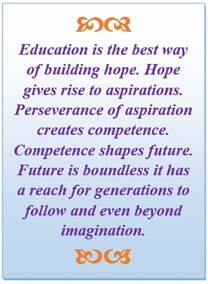 Coordinator’s View
Coordinator’s View
Hope vis-à-vis Despair
Hope signifies awareness of a person about possibilities and opportunities for betterment. Whereas, despair is either absence of hope or loss of hope. Absence of hope is prevalent among those who remain disconnected with the environment either by choice or compulsion. While, loss of hope occurs with those who fail to convert their hope into reality. Loss of hope can be on account of deprivation or confinement. While, deprivation could be because of geographical, social or economic reasons, which are beyond control of an individual. But, confinement is either due to unawareness of one’s own strengths and potentials, or unwillingness to avail opportunities. Nothing can be done about the latter. But, in the rest of the cases society, especially elites, can play a big role for the larger good. This article takes forward our ground level experience, for nearly a decade, of mentoring deprived children so as to groom in them competence to compete with the sense of Personal Social Responsibility (PSR). Arousing optimism among elites, so as to come out of complacence, is the aim of this article.
|
E |
ducation is not literacy. Literacy helps only to enhance awareness of the polity. Whereas, education starts with observations, and ends in evolving solutions and implement of solutions for larger good. Generally, people are branded as mediocre or intelligent, while classification as wise is done rarely. Wise are those who use their knowledge and ability to act for the larger good. Attention of the people in despair, amid common tendency of people to look ahead and upward, is generally missed.
It is observed that intelligence of students is a subjective parameter and is based on affluence and needs of survival. Children from adequately fed-caring families demonstrate intelligence directed towards personal growth. Whereas, children living under deprivation grow with the survival instinct as brought out by Charles Darwin in his Theory of Evolution. Yet, the gap and disparity in intelligence among people increases with the difference in exposure of students. Therefore, comparing students coming from different backgrounds on a common scale is unfair.
 Intelligence derived out of information makes persons more demanding
and it prompts them to thrive on expectations. They are mostly part of the
problem. This has spiraled and continuing to commercialize
education. Whereas persons growing with competence to evolve solution to
the problems and implement the solutions form a group of problem solvers. Such
competent people build hope and aspire to fulfill their hopes.
Intelligence derived out of information makes persons more demanding
and it prompts them to thrive on expectations. They are mostly part of the
problem. This has spiraled and continuing to commercialize
education. Whereas persons growing with competence to evolve solution to
the problems and implement the solutions form a group of problem solvers. Such
competent people build hope and aspire to fulfill their hopes.
In view of this a welfare state and society has responsibility to ensure that every child is groomed to build competence; encourage them to dream; build hopes in them; and create an environment wherein they aspire to accomplish their dreams. This is a huge task. None, howsoever powerful or resourceful may be, can do it singularly. It requires collective complementing of efforts. Elite persons and especially senior citizens can play a big role to create a difference.
It is important to consider that freebees are retardants in building hope and in turn growth process. It converts recipient of freebees into parasites. It would not be wrong to call freebees as slow poison. One has to participate in the process of building hope and competition among equals as a necessity for growth. Education is the best way of building hope. Hope gives rise to aspirations. Perseverance of aspiration creates competence. Competence shapes future. Future is boundless; it has a reach for generations to follow and even beyond imagination.
Our present is a result of efforts undertaken selflessly by our unknown predecessors right from the predator stage to solve their immediate problems of survival. Eventually, it has had projection beyond; it has created better future of human civilization. We have no right to selfishly reap benefits of their painstaking efforts.
We elites are blessed enough to be able to think and act, and collectively complement efforts to build hope among children beyond our family. It is not the least of overdoing or charity. It is just an effort to perpetuate the legacy that we relish; it is neither Daan (दान- selfless offerings) nor Yagya (यज्ञ -sacrifice). It is a Tapasya (तपस्या -selfless pursuit) for the larger good.
Conclusions: Education is the best way of bringing in welfare of polity. It would seed in them a hope to come out of despair. It is primary duty of the state and society. We elites are the most appropriate persons to perpetuate the legacy that we live in. It is to be executed not through paying our dues in the form of statutory taxes only; rather it is obligatory on us to act beyond self with the sense of Personal Social Responsibility (PSR). Most of us are physically and financially blessed to be able to do it. Moreover, with intellectual honesty we can create a difference. We vouch from our experience of a decade that that it brings home a great mental solace as well as moral and spiritual satisfaction to us. It is the real need of the age and stage that we have lived. It also entails a sense of pride to our beloved descendants. This cannot be bestowed upon them either with any amount of wealth or the fame, power or position. Let us become a change-catalyst….; let us become a part of the solution…; let our children compete to grow with happiness in peace, harmony, togetherness….
—00—